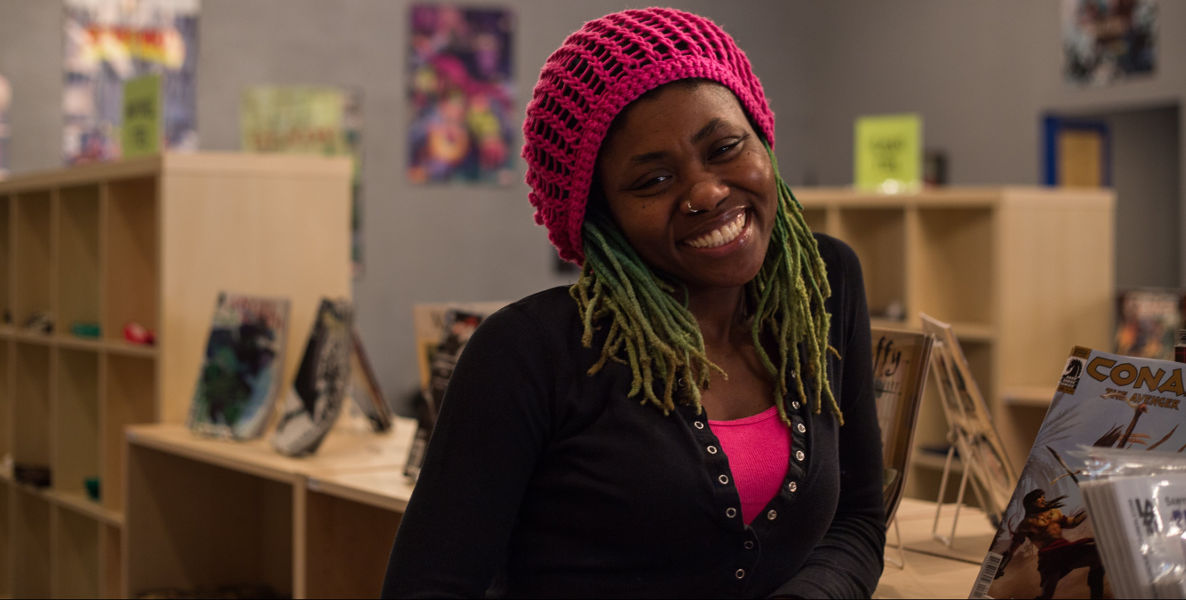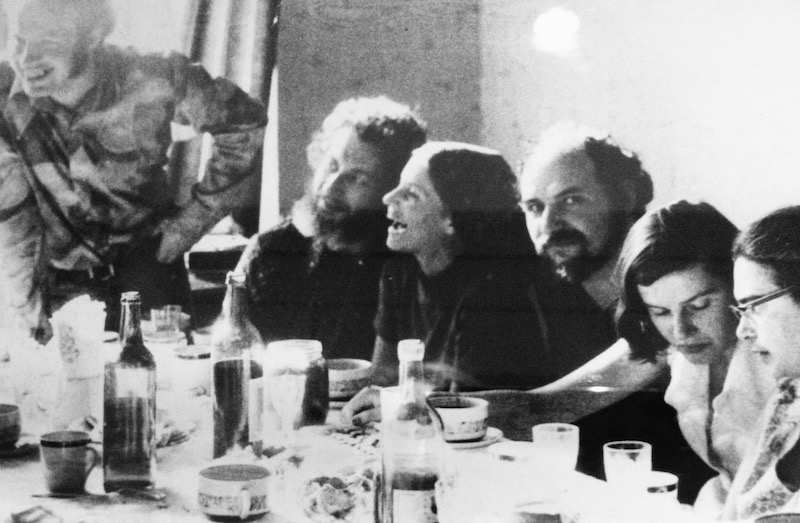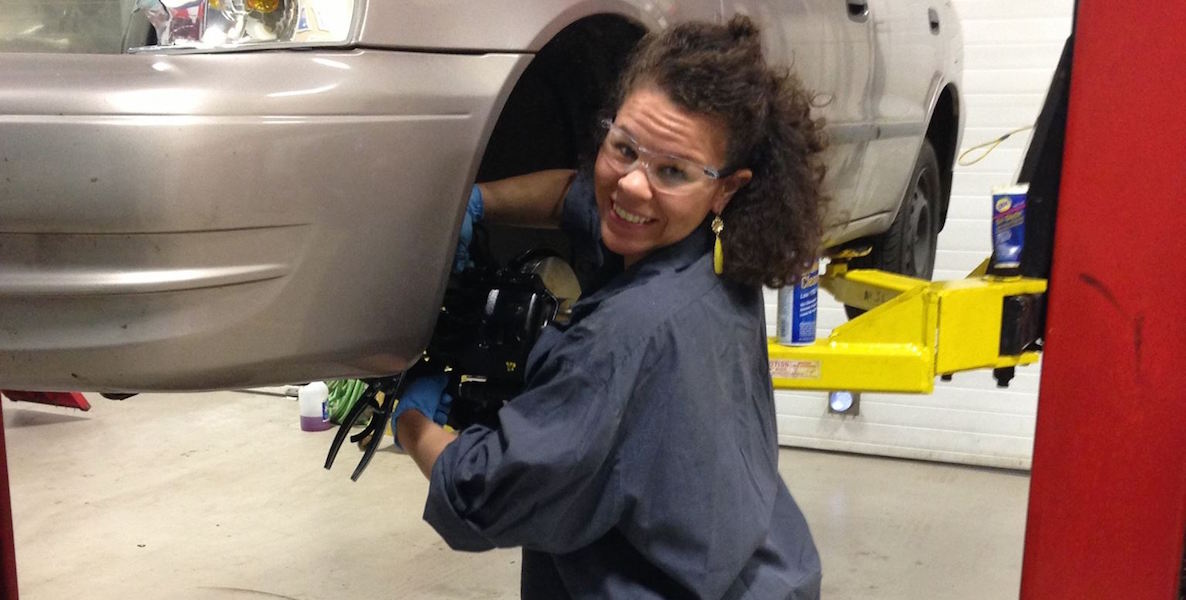Patrice Banks has always prided herself as being a strong woman. As a materials engineer, she had a growing career at DuPont, persevering as one of few women in her industry. She balked at being helpless, even learning to replace the toilet in her home rather than pay a man to do it for her. But there was one area in her life where Banks still felt completely unempowered: her car. When it came to fixing and maintaining this important investment, she says, she was an “auto airhead.”
“For the longest time I just accepted that I was a turn the key girl,” she says. “Just get in the car and go. I felt taken advantage of all the time, whether I was or not. If a light would pop on in my car, I would be like oh no, oh no, oh no!”
It’s a familiar feeling, for many women. While women now hold more drivers licenses than men and spend more money each year on buying and having their cars repaired—more than $200 billion—they have good reason for these auto mechanic jitters. In a 2013 survey of car owners and lessees, 77 percent said mechanics are more likely to sell women unnecessary repairs, and a recent Northwestern University study found that auto-repair shops give women significantly higher price quotes than men. Meanwhile, just two percent of auto mechanics and technicians in the United States are women.
Banks is trying to change all that. She took auto mechanic classes to learn how to fix up her own car, and started SheCanics, to help women get informed and get empowered about their cars through monthly workshops, and a virtual discussion and support group. And in September, she’s opening her own woman-focused garage, Girls Auto Clinic Repair Center, in Upper Darby.
“I want to create a safe space for women to have their cars serviced, ask questions about cars, and provide opportunities to women for career growth in the automotive industry,” says Banks. “This is about female empowerment.”
Opening this September, the shop will be a full service auto repair and detailing shop open to all genders, but staffed by female mechanics. “We might hire a male mechanic or two for a different perspective,” Banks says, laughing, “or maybe a few nice looking tire boys.”
Banks was raised in in Phoenixville by a single mom who didn’t drive. She studied engineering at Lehigh University, snagged a job with DuPont right out of school and lived all over the country. She always jumped at any opportunity to hold a workshop for girls or support any cause that brought more girls and women into engineering or STEM fields. But as a busy woman, she also began to notice that she lacked a lot of the informal knowledge it took to fix things around the house. Instead, she often had to pay men to perform these services.
Then she got a job in Delaware and returned to her Philadelphia stomping grounds. As she put down roots, these problems only became more pronounced. When the toilet broke in her house, she went to Home Depot, bought a new one, and installed it herself using a how-to video she found on YouTube.
“These things aren’t difficult,” Banks says, “but women are just less likely to have been shown how to do them when we were growing up. I wanted to start an online university for women where I would teach them things that men seemed to know already or that they still had to pay a man to do.”
Banks began surveying her friends, women she met through her job, the woman she bought coffee from each morning. She asked them: What do you wish you knew how to do for yourself but don’t? Overwhelmingly, the answer was: Fix my car. Banks looked for a woman mechanic she could talk to for a blog about car maintenance. She couldn’t find one. So at 32, she became a mechanic herself, going back to school at night for automotive technology while still working full time for DuPont.
“I went right up to the teacher and said, ‘I’m here to learn everything so I can create a shop for women, I’m here on a mission,’” Banks says. “They respected that. I kept raising my hand and got straight As.”
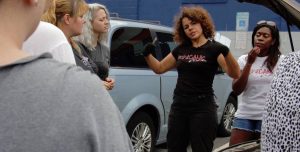
Like many women who train as mechanics, Banks encountered sexism. She was told, You’re too petite; you’re too pretty; you don’t really know what you’re doing—especially when it came to the hands-on work. “It was the first time I had ever picked up a ratchet and I was nervous,” she says.” But it was really important that I didn’t step back and let the men do it. I wanted to learn.”
Banks bought a used car on Craigslist while she was in school so she could take it apart for practice at home. She wrote down what she was learning in simple language to share with other women. And in 2013, knowing that knowledge sharing would be a key part of her dream repair shop, she started offering free Saturday workshops for women to help them learn about their cars. The first one was for a sorority at the University of Delaware.
They loved it, so Banks started putting the word out publicly, holding them on the lot of a West Philadelphia repair shop that liked Banks’ mission. Sometimes, no one showed up; sometimes, at first, she’d have just one or two people. But she kept at it, learning how to present what she knew about cars, and her bigger picture vision.
In those days, Banks would go to the office in a suit and high heels, then drive to school and change into comfortable work clothes. One day, she forgot her change of clothes at home. “Well,” she recalls, “I wasn’t going to drive all the way back to the city. So I just went in my slacks and heels.” She was under a GMC truck, removing a starter, and somebody snapped a picture. Banks later posted it to Facebook, where it got the most likes she’d ever received.
That was the start of the Girls Auto Clinic brand; her logo features a woman in Banks’ signature—red high heels—working under a car.
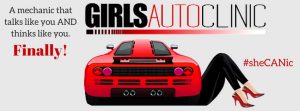 In January 2014, Banks made the leap and quit her lucrative engineering career for a job in a Roxborough repair shop that barely covered her bills but gave her more experience and a behind the scenes look at what drives a successful garage. All the while, she was writing a Girls Auto Clinic “Glove Box Guide” book and building her online community, #SheCanics—“a safe, judgment-free space to ask your car-related questions, a supportive place to talk freely about your car-related struggles and triumphs and an inclusive space to connect with other women determined to gain empowerment and feel good about owning their cars.”
In January 2014, Banks made the leap and quit her lucrative engineering career for a job in a Roxborough repair shop that barely covered her bills but gave her more experience and a behind the scenes look at what drives a successful garage. All the while, she was writing a Girls Auto Clinic “Glove Box Guide” book and building her online community, #SheCanics—“a safe, judgment-free space to ask your car-related questions, a supportive place to talk freely about your car-related struggles and triumphs and an inclusive space to connect with other women determined to gain empowerment and feel good about owning their cars.”
Word of mouth began to spread about her workshops. “What didn’t I learn?” says Chrissy W, a Mt. Airy photographer, who took one of Banks’ Saturday classes. “I knew I needed to get better informed about cars before I bought my first one but no one would give me the information in a respectful way. I learned what rotors are, what coolant is, I have more confidence now in buying and negotiating and maintaining a car. I can’t wait for Patrice’s garage to open. I don’t plan on going anywhere else.”
Using her own savings, Banks is making her dream of the Girls Auto Clinic Repair Center a reality. Opening this September, the shop will be a full service auto repair and detailing shop open to all genders, but staffed by female mechanics. “We might hire a male mechanic or two for a different perspective,” Banks says, laughing, “or maybe a few nice looking tire boys. ”
“I want to create a safe space for women to have their cars serviced, ask questions about cars, and provide opportunities to women for career growth in the automotive industry,” says Banks. “This is about female empowerment.”
The shop will cater to women with a beautiful lounge offering a play area for kids, as well as an on-site nail salon and blowout bar. Banks also hopes to offer the space as a place to hold female empowerment events and to highlight other women-owned businesses, a kind of “clubhouse for women” in Philadelphia. All together, she expects the project to cost nearly a million dollars. She is currently seeking between $50,000 to $135,000 in investors.
Her automotive philosophy will emphasize relationship-building over the hard-sell, treating women with respect, and offering them options that they understand and that fit their budget. “Most shops want to make money now—they don’t think you’re gonna come back in a year,” Banks says. “But a good mechanic knows it’s actually better business to be straight with customers, explain the problem, teach them to watch for the signs of it getting worse, and find a financial happy medium.”
The #SheCanics Facebook group now has nearly 2,500 members and her Glove Box Guide will be published by a division of Simon and Schuster next spring. Banks gets emails everyday from women around the world, asking her to open a shop in Boston, Atlanta, London—not to mention calls from Oprah magazine and offers to do reality television. She hopes that one day she will be able to franchise to cities all over the United States, and is excited about expanding her workshops—which are always sold out now—to reach college-aged women and younger girls to start to truly change the perception that the auto industry is for boys and men.
“They’re the SheCanics of the future,” Banks says. “The possibilities are endless.”
Correction: A previous version of this story misstated the location of Banks’ auto shop. It will be in Upper Darby.
Photo Header: Courtesy of Patrice Banks




